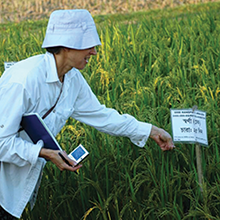Can the Scientific Reputation of Pamela Ronald, Public Face of GMOs, Be Salvaged?
http://www.independentsciencenews.org/news/can-the-scientific-reputation-of-pamela-ronald-public-face-of-gmos-be-salvaged/
Professor Pamela Ronald is probably the scientist most widely known for publicly defending genetically engineered (GE or GMO) crops. Her media persona, familiar to readers of the Boston Globe, the Wall Street Journal, the Economist, NPR, and many other global media outlets, is to take no prisoners.

by Jonathan Latham, PhD
Professor Pamela Ronald is probably the scientist most widely known for publicly defending genetically engineered (GE or GMO) crops. Her media persona, familiar to readers of the Boston Globe, the Wall Street Journal, the Economist, NPR, and many other global media outlets, is to take no prisoners.
After New York Times chief food writer Mark Bittman advocated GMO labelling, she called him “a scourge on science” who “couches his nutty views in reasonable-sounding verbiage”. His opinions were “almost fact- and science-free” continued Ronald. In 2011 she claimed in an interview with the US Ambassador to New Zealand: “After 14 years of cultivation and a cumulative total of two billion acres planted, GE crops have not caused a single instance of harm to human health or the environment.”

PAMELA RONALD
This second career of Pamela Ronald’s, as advocate of GMOs (which also includes being a book author, and contributor to and board member of the blog Biofortified) is founded on her first career: at the University of California in Davis she is Professor in the Department of Plant Pathology, Director of the Laboratory for Crop Genetics Innovation, and Director of Grass Genetics at the Joint BioEnergy Institute, among other positions.
This background is relevant because Pamela Ronald is now also fighting on her home front. Her scientific research has become the central question in a controversy that may destroy both careers. In the last year Ronald’s laboratory at UC Davis has retracted two scientific papers (Lee et al. 2009 and Han et al 2011) and other researchers have raised questions about a third (Danna et al 2011). The two retracted papers form the core of her research programme into how rice plants detect specific bacterial pathogens (1).
Etiquetas: en, Independent Science News, Jonathan Latham, Pamela Ronald

0 Comentarios:
Publicar un comentario
Suscribirse a Comentarios de la entrada [Atom]
<< Página Principal